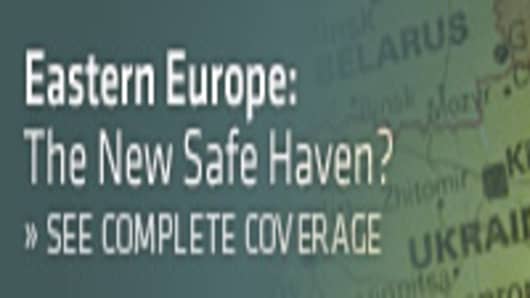The prime minister and Sulik, who is also parliament speaker, could achieve that goal by introducing various conditions to the vote, such as an exemption for their country from taking part in any future bailouts if the countries that benefit have higher pensions or lower unemployment than Slovakia, Juraj Karpis, an analyst with the Institute of Economic and Social Studies in Bratislava, told CNBC.com.
But Karpis, who describes himself as one of the few who spoke against the introduction of the euro in Slovakia before the single currency was adopted, doesn't believe that such a compromise will be reached, as "it sounds too good to be true."
Slovakia spent 10 percent of its gross domestic product to save its banks from collapse more than 10 years ago and has carried out numerous painful reforms in order to be able to join the euro. Now, its contribution to the EFSF would be more than 7 billion euros – another 10 percent of GDP.
Slovakia is poorer than it looks in official statistics, as many of the foreign companies setting up operations there transfer their profits abroad. The cost of the EFSF, calculated on a per-person basis, would be higher than in more developed euro zone members, Karpis explained.
"On a per capita cost, it would mean almost two months' worth of wages in Slovakia, whereas in Germany it means only 0.7 months," he said. "If we were to pay the money, we'd have to increase taxes twice more than Austria."
"If we didn't have the euro, we'd be better off," he added.
Euro Still Loved
Zdenko Stefanides, chief economist at Vub Banka, part of Italian bank Intesa Sanpaolo, thinks Slovaks still love the euro. In 2009, at the height of the crisis, they introduced the single currency and their purchasing power increased, so citizens were happy.
"Companies say benefits outweigh the costs of the euro," Stefanides said in an interview in Bratislava.
Exports make up 80 percent of Slovakia's GDP, he said, and of those, 85 percent go to the euro zone.
The country could have benefited from depreciation in the currency, Stefanides said, but firms want, more than anything, predictability, according to Stefanides.
Car producers make up about half of industrial production in Slovakia and account for around 60 percent of exports, according to Slovak Statistics Office data.
German carmaker Volkswagen has two factories and has taken on an additional 1,500 people to start production on its New Small Family range. France's Peugeot-Citroen and South Korea's Kia also have factories in Slovakia.






